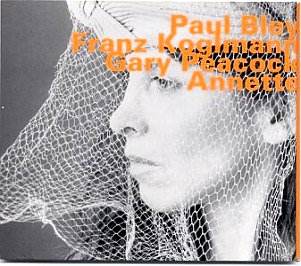PAUL BLEY, FRANZ KOGLMAN, GARY
PEACOCK
Annette
 hatOLOGY
564
hatOLOGY
564
Crotchet

This is a reissue of a tribute album to Annette Peacock that was originally
released in 1992. It is a timely reissue because Peacock herself re-emerged
last year with An Acrobat's Heart (on ECM). That was her first album
release in a decade, and showed that she can still create songs that bear
her trademark combination of delicacy and raw emotion.
Also worthy of mention is Nothing ever was anyway by Marilyn Crispell
(also on ECM) another tribute album to Peacock that has considerable overlap
with the compositions on Annette. (Incidentally, Crispell was joined
by Gary Peacock on bass and Paul Motian on drums, who were in Paul Bley's
trio in the sixties. The musical and personal cross connections here verge
on incestuous, and are far too complex to discuss here in detail, intriguing
as they are!).
Peacock's recording career (for want of a better word) has consisted of albums
released in fits and starts, often with long gaps in between. So these tribute
albums have served to give her a relatively high profile even when she herself
has not released new albums. She has the kind of cult status that money cannot
buy, and her compositions - though relatively few in number - are held in
the highest esteem by many respected players. Bley has recorded her compositions
over many years, some in several different versions, and they are cornerstones
of his discography (rivalled only by those of another of his ex-wives, Carla
Bley).
Although Paul Bley and Gary Peacock are both ex-husbands of Annette Peacock,
it was actually Franz Koglman who instigated this tribute.
Apart from an occasional flourish from Bley, the music here is very sparse.
The tempos are funereal. The songs (without vocals) are stripped back to
their bare essentials, revealing the simple beauty of their melodies, and
their emotional power. Of the twelve tracks, there are two versions each
of "Touching" and of "Blood" (both of which have lent their titles to past
Bley albums). Although referred to as "take 1" and "take 2" in each case,
that is disingenuous; the two are completely different versions, not retakes.
So, "Touching (take 1)" is a solo piano performance of some six minutes,
while take 2 lasts less than two minutes and is trumpet and bass duo.
The longest track here, "Mr Joy" (yes, also another Bley album title) is
typically melancholy, largely resulting from Koglman's work. He has the ability
to convey deep emotions in comparatively few notes, by his use of tone and
phrasing. He recognises the power of a pregnant pause that can say far more
than a flurry of notes. On the only original track here, "Annette", his playing
is at its sparest and most economical, but also its most affecting; he plays
little and repeatedly holds long notes that bristle with pathos. However,
it is unjust to single Koglman out. Paul Bley - as ever - is totally distinctive
and also spellbinding throughout. Peacock does nothing unnecessary or intrusive,
yet is an essential ingredient of the overall success of the music.
This is music that is shot through with sadness. Nonetheless, it is also
some of the most beautiful music produced in the past decade. Annette
forms a perfect threesome with Nothing ever was anyway and An
Acrobat's Heart.